常见翻译句型
英语翻译常用句型(加精)
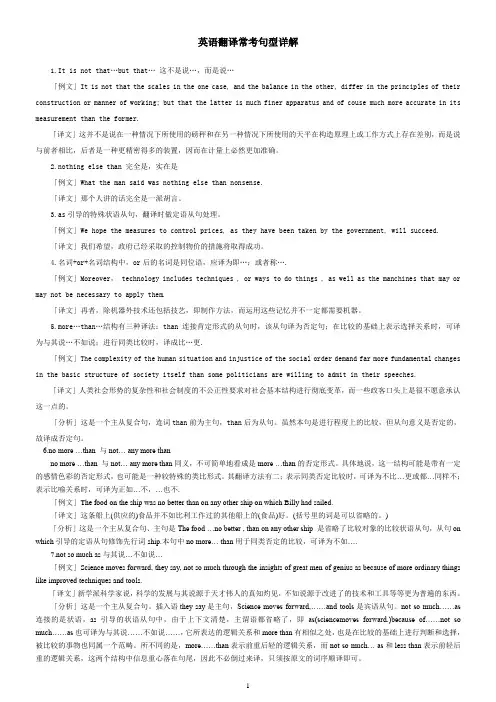
英语翻译常考句型详解1.It is not that…but that… 这不是说…,而是说…「例文」It is not that the scales in the one case, and the balance in the other, differ in the principles of their construction or manner of working; but that the latter is much finer apparatus and of couse much more accurate in its measurement than the former.「译文」这并不是说在一种情况下所使用的磅秤和在另一种情况下所使用的天平在构造原理上或工作方式上存在差别,而是说与前者相比,后者是一种更精密得多的装置,因而在计量上必然更加准确。
2.nothing else than 完全是,实在是「例文」What the man said was nothing else than nonsense.「译文」那个人讲的话完全是一派胡言。
3.as引导的特殊状语从句,翻译时做定语从句处理。
「例文」We hope the measures to control prices, as they have been taken by the government, will succeed.「译文」我们希望,政府已经采取的控制物价的措施将取得成功。
4.名词+or+名词结构中,or后的名词是同位语,应译为即…;或者称….「例文」Moreover, technology includes techniques , or ways to do things , as well as the manchines that may or may not be necessary to apply them.「译文」再者,除机器外技术还包括技艺,即制作方法,而运用这些记忆并不一定都需要机器。
英语四级翻译常见句型
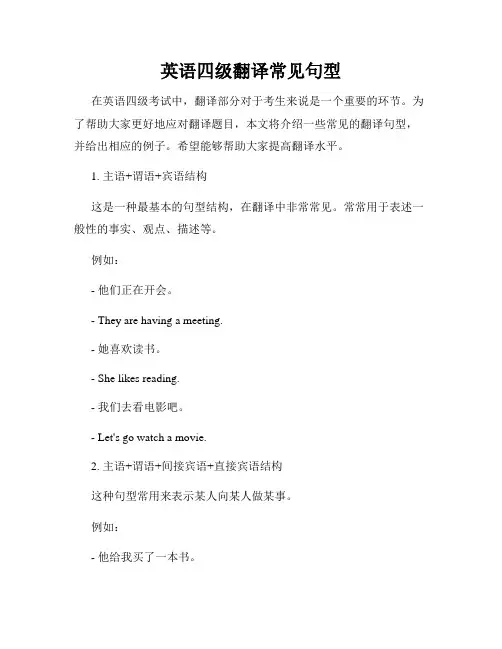
英语四级翻译常见句型在英语四级考试中,翻译部分对于考生来说是一个重要的环节。
为了帮助大家更好地应对翻译题目,本文将介绍一些常见的翻译句型,并给出相应的例子。
希望能够帮助大家提高翻译水平。
1. 主语+谓语+宾语结构这是一种最基本的句型结构,在翻译中非常常见。
常常用于表述一般性的事实、观点、描述等。
例如:- 他们正在开会。
- They are having a meeting.- 她喜欢读书。
- She likes reading.- 我们去看电影吧。
- Let's go watch a movie.2. 主语+谓语+间接宾语+直接宾语结构这种句型常用来表示某人向某人做某事。
例如:- 他给我买了一本书。
- He bought me a book.- 我们给他寄了一封信。
- We sent him a letter.- 她借给我一本小说。
- She lent me a novel.3. 主语+系动词+表语结构这种句型用来表示主语的性质、状态、特征等。
例如:- 青岛是一个美丽的城市。
- Qingdao is a beautiful city.- 他们的想法是正确的。
- Their ideas are correct.- 这个问题很复杂。
- This problem is complicated.4. 主语+系动词+宾语结构这种句型用来表示主语的感觉、看法、认识等。
例如:- 我觉得很累。
- I feel tired.- 他看起来很生气。
- He looks angry.- 他们认为这个计划是有希望的。
- They think the plan is promising.5. 被动语态被动语态在翻译中经常被使用,用来表示主语是动作的承受者。
例如:- 这本小说被翻译成了多种语言。
- This novel has been translated into various languages.- 他被授予了最佳演员奖。
文学翻译常用句型
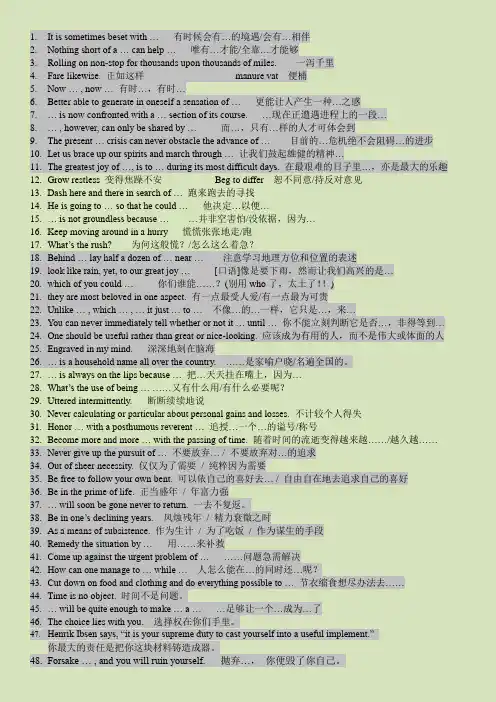
1.It is sometimes beset with … 有时候会有…的境遇/会有…相伴2.Nothing short of a … can help … 唯有…才能/全靠…才能够3.Rolling on non-stop for thousands upon thousands of miles. 一泻千里4.Fare likewise. 正如这样manure vat 便桶5.Now … , now … 有时…,有时…6.Better able to generate in oneself a sensation of … 更能让人产生一种…之感7.… is now confronted with a … section of its course. …现在正遭遇进程上的一段…8.… , however, can only be shared by … 而…,只有…样的人才可体会到9.The presen t … crisis can never obstacle the advance of … 目前的…危机绝不会阻碍…的进步10.Let us brace up our spirits and march through … 让我们鼓起雄健的精神…11.The greatest joy of …, is to … during its most difficult days. 在最艰难的日子里…,亦是最大的乐趣12.Grow restless 变得焦躁不安Beg to differ 恕不同意/持反对意见13.Dash here and there in search of … 跑来跑去的寻找14.He is going to … so that he could … 他决定…以便…15.… is not groundless because … …并非空害怕/没依据,因为…16.Keep moving around in a hurry 慌慌张张地走/跑17.What’s the rush? 为何这般慌?/怎么这么着急?18.Behind … lay half a dozen of … near … 注意学习地理方位和位置的表述19.look like rain, yet, to our great joy … [口语]像是要下雨,然而让我们高兴的是…20.which of you could … 你们谁能……?(别用who了,太土了!!)21.they are most beloved in one aspect. 有一点最受人爱/有一点最为可贵22.Unlike … , which … , … it just … to … 不像…的…一样,它只是…,来…23.You can never immediately tell whether or not it … until …你不能立刻判断它是否…,非得等到…24.One should be useful rather than great or nice-looking. 应该成为有用的人,而不是伟大或体面的人25.Engraved in my mind. 深深地刻在脑海26.… is a household name all over the country. ……是家喻户晓/名遍全国的。
翻译常用句型
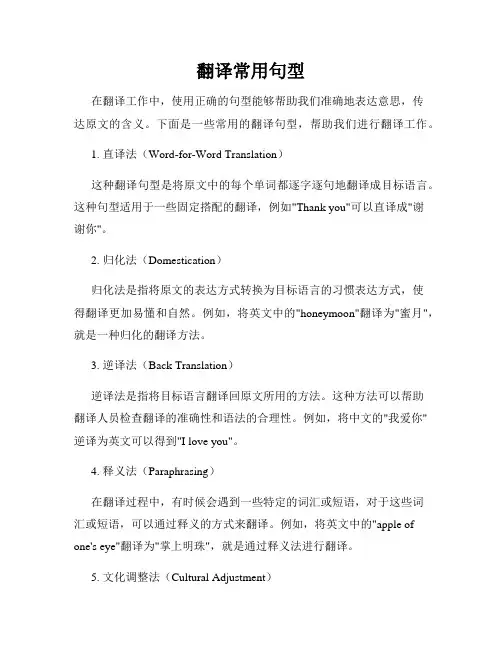
翻译常用句型在翻译工作中,使用正确的句型能够帮助我们准确地表达意思,传达原文的含义。
下面是一些常用的翻译句型,帮助我们进行翻译工作。
1. 直译法(Word-for-Word Translation)这种翻译句型是将原文中的每个单词都逐字逐句地翻译成目标语言。
这种句型适用于一些固定搭配的翻译,例如"Thank you"可以直译成"谢谢你"。
2. 归化法(Domestication)归化法是指将原文的表达方式转换为目标语言的习惯表达方式,使得翻译更加易懂和自然。
例如,将英文中的"honeymoon"翻译为"蜜月",就是一种归化的翻译方法。
3. 逆译法(Back Translation)逆译法是指将目标语言翻译回原文所用的方法。
这种方法可以帮助翻译人员检查翻译的准确性和语法的合理性。
例如,将中文的"我爱你"逆译为英文可以得到"I love you"。
4. 释义法(Paraphrasing)在翻译过程中,有时候会遇到一些特定的词汇或短语,对于这些词汇或短语,可以通过释义的方式来翻译。
例如,将英文中的"apple of one's eye"翻译为"掌上明珠",就是通过释义法进行翻译。
5. 文化调整法(Cultural Adjustment)在进行跨文化翻译时,有时候需要对原文进行文化上的调整,使得翻译更符合目标语言的文化习惯和价值观。
例如,将英文的"black cat"翻译为中文时,可以添加"瑞"或"吉"这样的字眼,因为在中国文化中,黑猫往往象征着好运。
6. 意译法(Free Translation)意译法是指在翻译过程中,将原文的意思进行合理转换,以使得翻译更符合目标语言的语法和表达习惯。
英文翻译中常见的句型
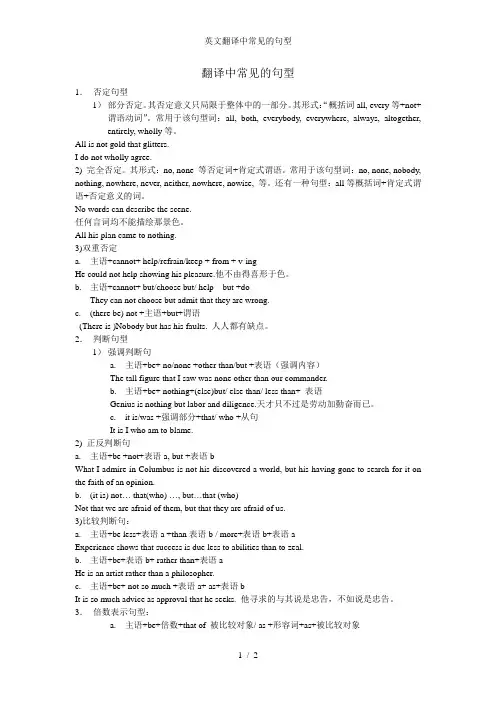
翻译中常见的句型1.否定句型1)部分否定。
其否定意义只局限于整体中的一部分。
其形式:“概括词all, every等+not+谓语动词”。
常用于该句型词:all, both, everybody, everywhere, always, altogether, entirely, wholly等。
All is not gold that glitters.I do not wholly agree.2) 完全否定。
其形式:no, none 等否定词+肯定式谓语。
常用于该句型词:no, none, nobody, nothing, nowhere, never, neither, nowhere, nowise, 等。
还有一种句型:all等概括词+肯定式谓语+否定意义的词。
No words can describe the scene.任何言词均不能描绘那景色。
All his plan came to nothing.3)双重否定a.主语+cannot+ help/refrain/keep + from + v-ingHe could not help showing his pleasure.他不由得喜形于色。
b.主语+cannot+ but/choose but/ help but +doThey can not choose but admit that they are wrong.c.(there be) not +主语+but+谓语(There is )Nobody but has his faults. 人人都有缺点。
2.判断句型1)强调判断句a.主语+be+ no/none +other than/but +表语(强调内容)The tall figure that I saw was none other than our commander.b.主语+be+ nothing+(else)but/ else than/ less than+ 表语Genius is nothing but labor and diligence.天才只不过是劳动加勤奋而已。
英语高考常用句型翻译
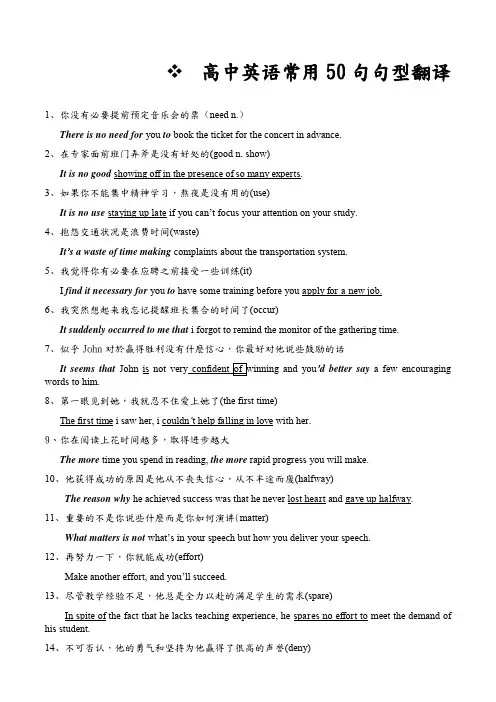
高中英语常用50句句型翻译1、你没有必要提前预定音乐会的票(need n.)There is no need for you to book the ticket for the concert in advance.2、在专家面前班门弄斧是没有好处的(good n. show)It is no good showing off in the presence of so many experts.3、如果你不能集中精神学习,熬夜是没有用的(use)It is no use staying up late if you can’t focus your attention on your study.4、抱怨交通状况是浪费时间(waste)It’s a waste of time making complaints about the transportation system.5、我觉得你有必要在应聘之前接受一些训练(it)I find it necessary for you to have some training before you apply for a new job.6、我突然想起来我忘记提醒班长集合的时间了(occur)It suddenly occurred to me that i forgot to remind the monitor of the gathering time.7、似乎John对於赢得胜利没有什麽信心,你最好对他说些鼓励的话It seems that John is not very confident of winning and you’d better say a few encouraging words to him.8、第一眼见到她,我就忍不住爱上她了(the first time)The first time i saw her, i couldn’t help falling in love with her.9、你在阅读上花时间越多,取得进步越大The more time you spend in reading, the more rapid progress you will make.10、他获得成功的原因是他从不丧失信心,从不半途而废(halfway)The reason why he achieved success was that he never lost heart and gave up halfway.11、重要的不是你说些什麽而是你如何演讲(matter)What matters is not what’s in your speech but how you deliver your speech.12、再努力一下,你就能成功(effort)Make another effort, and you’ll succeed.13、尽管教学经验不足,他总是全力以赴的满足学生的需求(spare)In spite of the fact that he lacks teaching experience, he spares no effort to meet the demand of his student.14、不可否认,他的勇气和坚持为他赢得了很高的声誉(deny)There is no denying that his courage and perseverance won him great reputation.15、毋庸置疑,这场事故应该怪司机(doubt)There is no doubt that the driver is to blame for the accident.16、吹嘘你能跑多快没意思(point)There is no point boasting about how fast you can run.17、过不了多久这位老人就能从疾病中痊愈(before)It wo n’t be long before the old man recovers from his illness.18、如果你能联系上那家电脑公司我将不胜感激(appreciate)I’d appreciate it very much if you could make contact with the computer company.19、据说缺席此次会议的人数达到了100人(add)It’s said that the number of people who are absent from the meeting adds up to 100.20、有志者,事竟成(where)Where there is a will, there is a way.21、俗话说,值得一做的事就值得做好(worth)As an old saying goes, what is worth doing is worth doing well.22、有消息传出,这位着名的女演员(word)Word came that the famous actress was accused of murder.23、似乎没有必要再等,很有可能他们不会出现了(need n. chances)There seems no need to wait any more and chances are that they won’t turn up.24、这个计划是否能顺利实行还有待观察(remain)It remains to be seen whether the plan can be carried out smoothly.25、令我们最吃惊的是它能在这麽短的时间内适应新的环境(adapt)What surprised me most was that he could adapt himself to the new surroundings during such a short time.26、是你经过自信观察得出结论的时候了(high time)It’s (about/high) time for you to draw/form/make/arrive at a conclusion after careful observation.27、她刚下火车我就发现她把笔记本电脑落在座位上了(Hardly)Hardly had she got off the train when i found that she left her laptop on the chair.28、难怪他不饿,他整天吃糖(wonder)It’s no wonder that he is not hungry, he has been eating sweets all day.29、直到他被授予了诺贝尔奖和平奖,人们才知道他的名字(Not)Not until he was rewarded the Nobel Peace Prize did people know his name.30、正是因为这场死亡十人的可怕的交通事故,这条路被封了数小时(It)It was because of the terrible accident involving 10 people that the road was closed for hours. 31、只有停电的时候我们才会意识到电的重要(Only)Only when there is a power cut can we realize how important electricity is.32、谈到物理,我一片茫然(come to)When it comes to physics, I’m completely at sea.33、人们认为政府理所当然应该采取行动阻断疾病的传播(It)It is taken for granted that the government should take action to prevent the disease from spreading.34、众所周知,很多因素促成了他在科学研究上的成就(contribute)As is known to all that many factors contributed to his great achievement in scientific research.It is known to all that many factors contributed to his great achievement in scientific research.35、实现登月之梦花了人类很多年(It)It takes man many years to realize the dream of landing on the moon.36、有可能老师会采纳学生会提出的建议(likely)It’s likely that the teacher will take/adopt the advice put forward by the Students’ Union.The teacher is likely to take/adopt the advice put forward by the Students’ Union.37、他出国已经五年了(since)It is 5 years since he went abroad.38、教授如此专注于实验,没有察觉到变化多端的天气(absorb)The professor was so absorbed in the experiment that he was not aware of the changing weather.39、一定要把安全守则牢记心中(sure)Be sure to keep the safety rules in mind.40、他退休後肯定会把公司转交给他的儿子(certain)It is certain that he’ll hand over his company to his son after retirement.41、有种日益发展的趋势,人们在网上购物而不是去商场(instead)There is a growing trend that people shop online instead of going to the department stores. 42、阅读对於头脑就像事物对於身体(what)Reading is to the mind what food is to the body.43、你同不同意这个计划不重要(make difference)It makes no difference whether you agree to the plan or not.44、我们是否要推迟运动会取决於天气(It)It all depends on the weather whether we’ll put off the sports meeting.45、这位老人把每天进行的一小时体育锻炼作为一项规定(it)The old man makes it a rule to do an hour’s physical exercise every day.46、请确定你在预定的日期前完成这项工作(sure)Make sure that you finish the task before the scheduled date.47、你和新同事相处不可能费力(difficulty)It is impossible for you to have any difficulty in getting along with your new colleagues.48、他非常高尚把一生都奉献给帮助聋儿(It)It is noble of her to devote her life to helping the deaf children.49、你最好留出足够的钱来支付额外的开销(set aside)You’d better set aside enough money to pay for the extra expense.It’s better for you to set aside enough money to pay for the extra expense.。
英语六级翻译常见句型
英语六级翻译常见句型1. “对...有一个清晰的了解” = have a clear understanding of...Example: 在新的项目上,我们需要对所有的细节都有一个清晰的了解。
In the new project, we need to have a clear understanding of all the details.2. “在某种程度上” = to some extentExample: 在某种程度上,我同意你的观点。
To some extent, I agree with your point of view.3. “没有什么比...更重要了” = Nothing is more important than...Example: 对于一家公司来说,没有什么比员工的满意度更重要了。
For a company, nothing is more important than employee satisfaction.4. “(与...)相比” = compared with/to...Example: 相比其他竞争对手,我们的产品更具优势。
Compared with/to other competitors, our product has more advantages.5. “随着时间的推移” = over timeExample: 随着时间的推移,我对这个城市的好感越来越深。
Over time, I have developed a stronger fondness for this city.6. “不管怎样” = regardless of...Example: 不管怎样,我们必须努力达到我们的目标。
Regardless of the circumstances, we must strive to achieve our goals.7. “一方面...另一方面...” = On the one hand...On the other hand...Example: 一方面,这个决策会带来更多的机会;另一方面,它也存在一些风险。
翻译常用句型
翻译常用句型1. How are you doing? 你好吗?2. Can you help me? 你能帮我吗?3. What's your name? 你叫什么名字?4. Where are you from? 你从哪里来?5. How old are you? 你多大了?6. Can I have a glass of water, please? 我可以来杯水吗?7. What time is it? 几点了?8. I love you. 我爱你。
9. Thank you. 谢谢你。
10. How much does it cost? 这个多少钱?11. Where is the restroom? 厕所在哪里?12. I'm sorry. 对不起。
13. Can you speak English? 你会说英语吗?14. Where can I find a taxi? 我在哪里可以找到出租车?15. What's the weather like today? 今天天气怎么样?16. I'm hungry. 我肚子饿了。
17. What's your favorite color? 你最喜欢的颜色是什么?18. How do you say this in English? 这个用英语怎么说?19. Where do you live? 你住在哪里?20. I don't understand. 我不明白。
21. Can you repeat that, please? 你能重复一遍吗?22. I'm tired. 我累了。
23. What's your occupation? 你的职业是什么?24. What's your favorite food? 你最喜欢的食物是什么?25. How was your day? 你今天过得怎么样?26. Can you recommend a good restaurant? 你能推荐一家好的餐厅吗?27. Where is the nearest bus stop? 最近的公交车站在哪里?28. Do you have any siblings? 你有兄弟姐妹吗?29. What's your phone number? 你的电话号码是多少?30. Can you lend me some money? 你能借我一些钱吗?31. What's your favorite movie? 你最喜欢的电影是什么?32. What's your favorite book? 你最喜欢的书是什么?33. How do you get to school? 你怎么去学校?34. What's your favorite sport? 你最喜欢的运动是什么?35. Can I have the bill, please? 能给我帐单吗?36. What's your favorite music genre? 你最喜欢的音乐类型是什么?37. How do you spell your name? 你的名字怎么拼?38. What's your favorite animal? 你最喜欢的动物是什么?39. Can I take a photo with you? 我可以和你合影吗?40. Where can I buy souvenirs? 我在哪里可以买纪念品?41. What's the capital of your country? 你的国家的首都是什么?42. Can you play a musical instrument? 你会弹奏乐器吗?43. What's your favorite hobby? 你最喜欢的爱好是什么?44. What's your favorite season? 你最喜欢的季节是什么?45. Can you teach me how to do that? 你能教我如何做吗?46. What's your favorite holiday? 你最喜欢的假期是什么?47. Can I try it on? 我可以试穿吗?48. What's your favorite song? 你最喜欢的歌曲是什么?49. How do you say "hello" in your language? 你的语言中怎么说“你好”?50. What's your favorite drink? 你最喜欢的饮料是什么?。
经典翻译13种句型
经典翻译12种句型
1. It is not until that …
• It was ___________________________ not until I entered college that (直到我进入大学) I realized the importance of English. It was not until she became a mother • _____________________________ (直到 她自己做了母亲) that she understand her mother’s feeling. • It was ___________________________ not until in my third year in high school that (直到高三) this idea to become a writer has taken hold
Maybe I would have sold twice as many copies ( as I had sold) without it.(line43) Subjunctive mood
倍数+as+ adj/adv + as 倍数+more than
eg: My book are three times as many as yours. My income this year is twice as much as I earned last year. If you spent half as much as you did on computer games, you would be a top student in you class.
初中英语常考句型翻译
初中英语常考句型翻译(一)1.对于青少年来说,学习如何交友是很重要的。
It’s important for teenagers to learn how to make friends.虽然雨下得正大,但是对于他来说,看来不跑完最后的200米是不可能的。
Although it is raining heavily, it looks that it’s impossible for him not to finish the last 200 meters.吃更多的蔬菜是有好处的。
ood to eat more vegetables.It’s g对于我们来说拥有充足的睡眠是重要的。
It’s important for us to have enough sleep.对于我们来说保持环境清洁是重要的。
It’s important for us to keep the environment clean.嘲笑残疾人是不礼貌的。
It’s impolite to laugh at disabled people.进行更多的锻炼对你的健康来说是有益的。
It’s good for your health to do more exercise.在太阳下读书对眼睛是有害的。
It’s bad for eyes to read in the sun.2.很抱歉,我的自行车坏了。
请再等我五分钟。
I’m sorry, there is something wrong with my bike. Please wait for me five moreminutes.我的电视机坏了,所以我不能看比赛了。
There is something wrong with my TV, so I can’t watch the match.我的计算机坏了。
你能帮助我修理一下吗?There is something wrong with my computer. Could you help me mend it?这台机器坏了。
- 1、下载文档前请自行甄别文档内容的完整性,平台不提供额外的编辑、内容补充、找答案等附加服务。
- 2、"仅部分预览"的文档,不可在线预览部分如存在完整性等问题,可反馈申请退款(可完整预览的文档不适用该条件!)。
- 3、如文档侵犯您的权益,请联系客服反馈,我们会尽快为您处理(人工客服工作时间:9:00-18:30)。
常见翻译句型
记完常考的重点翻译词汇,也要突击一下常考的翻译句型,连词成句,又稳拿好几分~
常考句型1:
形式主语it句(it is...(for sb) to do/that...)
例:我们城市的多数人将享受免费医疗,这是一定的。
【参考译文】It is certain that free medical care will be given to most people in our city.
常考句型2: 存在句(there be句型)
此处的be可以根据汉语意思变化为各种形式如appear to be, seem to be, happen to be, used to be, ought to be, must be。
存在句除了典型的there be结构,还可以用其他的系动词如live,stand,lie,come,exist,remain 等来替换系动词be。
例:那里曾经有来自其他国家的移民。
【参考译文】There used to be immigrants from other countries.
常考句型3:主谓宾结构句
例:中国将加速节能产业的发展,使其到2015年成为国民经济的支柱产业。
【参考译文】China will speed up the development of energy-saving industry and make it a pillar of the national economy by 2015.
常考句型4:比较句
如果汉语句中出现“(不)和/像......一样”,那么可以用同级比较句“主语+谓语+(not)so/as +形容词/副词原级+as+被比较的对象”
例:北京大学是中国成立最早、最著名的大学之一。
【参考译文】Peking University is one of the earliest and most famous universities in China.
其他常考句型
常考句型5:让步状语从句(Although... ; though...)
常考句型6:原因状语从句(...because....)
常考句型7:目的/结果状语从句(so (such)...that...;so that...)
常考句型8:条件状语从句(If...)
常考句型9:递进句(What’s more...;Moreover,...)
常考句型10:结果句(Therefore, ....;..., consequently, ...)。
